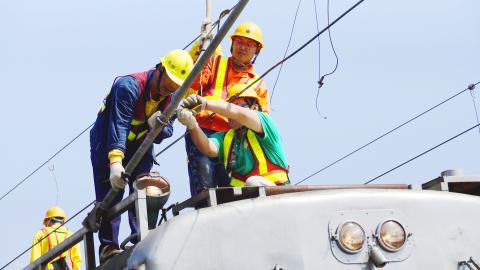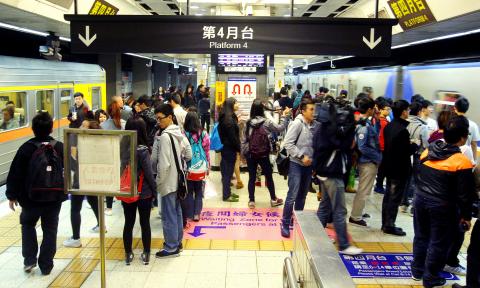Deputy Minister of Transportation and Communications Frank Fan (范植谷), who doubles as Taiwan Railways Administration (TRA) director-general, said yesterday that he and the administration would not dodge their responsibilities over mass train delays a day earlier.
Fan was referring to the delay of 138 trains, affecting more than 60,000 passengers, as a result of broken electric wires on a section of railway between Jhongli (中壢) and Yangmei (楊梅).
The problem occurred at 8:37am on Friday, the first day of the three-day 228 Memorial Day long weekend, when an overhead power line on the electrified rail system at Pusin Station (埔心) was sliced by the pantograph — the equipment on the roof of a train that collects power from an overhead cable — on a fast-moving train.

Photo: Lee Jung-ping, Taipei Times
The administration originally planned to resume operations on the track at 7:30pm on Friday. However, the resumption of services was postponed twice and normal operations were only resumed yesterday morning.
Fan yesterday held a press conference at the Taipei Railway Station to explain the incident and he bowed to apologize for the inconvenience caused.
Minister of Transportation and Communications Yeh Kuang-shih (葉匡時), who attended a TRA briefing later, also apologized for the incident, describing it as “a most unfortunate circumstance.”

Photo: CNA
He instructed that a full review of the refund system should be carried out in response to calls from the public.
Under the administration’s existing refund policy, only passengers on express trains can claim a full refund for a train delay of at least 45 minutes, while travelers on slower trains are not covered by the refund policy.
A TRA safety commission has started a probe into the incident and the investigation report may be released tomorrow.
In an unprecedented move, the TRA mobilized 52 technicians and five vehicles on Friday for an overnight repair job to replace 1.5km of electric cable at a cost of NT$15 million (US$495,210).
Fan said that the number of TRA passengers has risen every year, averaging more than 600,000 per day last year, with the number ballooning to 880,000 during the Lunar New Year holiday.
The nation’s railway infrastructure faces problems due to a lack of maintenance staff and dilapidated electric cables, Fan said.
The Western Line went electrical in 1979 and the electric cables usually have a life span of between 16 and 20 years. The cables at the Pusin Station have not been changed for 30 years. It is known that some of the electric cables on the Western Line are 34 years old.
The administration has replaced the cables between Keelung and Jhunan (竹南) in northern Taiwan, leaving 476km of old electric cables on the Western Line, and is aiming to complete the replacement of a further 22km of cables this year.
The TRA said it would need a budget of NT$2.08 billion over five years to replace all the old cables.

CHAOS: Iranians took to the streets playing celebratory music after reports of Khamenei’s death on Saturday, while mourners also gathered in Tehran yesterday Iranian Supreme Leader Ayatollah Ali Khamenei was killed in a major attack on Iran launched by Israel and the US, throwing the future of the Islamic republic into doubt and raising the risk of regional instability. Iranian state television and the state-run IRNA news agency announced the 86-year-old’s death early yesterday. US President Donald Trump said it gave Iranians their “greatest chance” to “take back” their country. The announcements came after a joint US and Israeli aerial bombardment that targeted Iranian military and governmental sites. Trump said the “heavy and pinpoint bombing” would continue through the week or as long

TRUST: The KMT said it respected the US’ timing and considerations, and hoped it would continue to honor its commitments to helping Taiwan bolster its defenses and deterrence US President Donald Trump is delaying a multibillion-dollar arms sale to Taiwan to ensure his visit to Beijing is successful, a New York Times report said. The weapons sales package has stalled in the US Department of State, the report said, citing US officials it did not identify. The White House has told agencies not to push forward ahead of Trump’s meeting with Chinese President Xi Jinping (習近平), it said. The two last month held a phone call to discuss trade and geopolitical flashpoints ahead of the summit. Xi raised the Taiwan issue and urged the US to handle arms sales to

BIG SPENDERS: Foreign investors bought the most Taiwan equities since 2005, signaling confidence that an AI boom would continue to benefit chipmakers Taiwan Semiconductor Manufacturing Co’s (TSMC, 台積電) market capitalization swelled to US$2 trillion for the first time following a 4.25 percent rally in its American depositary receipts (ADR) overnight, putting the world’s biggest contract chipmaker sixth on the list of the world’s biggest companies by market capitalization, just behind Amazon.com Inc. The site CompaniesMarketcap.com ranked TSMC ahead of Saudi Aramco and Meta Platforms Inc. The Taiwanese company’s ADRs on Tuesday surged to US$385.75 on the New York Stock Exchange, as strong demand for artificial intelligence (AI) applications led to chip supply constraints and boost revenue growth to record-breaking levels. Each TSMC ADR represents

State-run CPC Corp, Taiwan (CPC, 台灣中油) yesterday said that it had confirmed on Saturday night with its liquefied natural gas (LNG) and crude oil suppliers that shipments are proceeding as scheduled and that domestic supplies remain unaffected. The CPC yesterday announced the gasoline and diesel prices will rise by NT$0.2 and NT$0.4 per liter, respectively, starting Monday, citing Middle East tensions and blizzards in the eastern United States. CPC also iterated it has been reducing the proportion of crude oil imports from the Middle East and diversifying its supply sources in the past few years in response to geopolitical risks, expanding